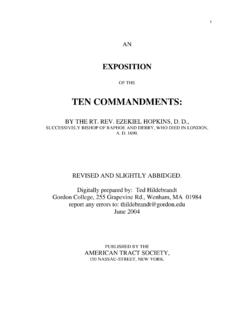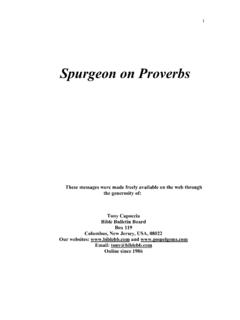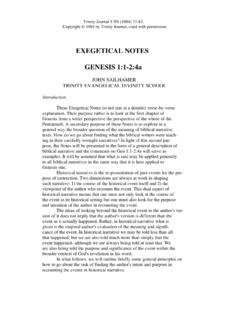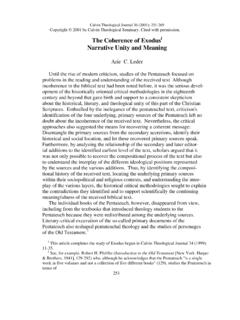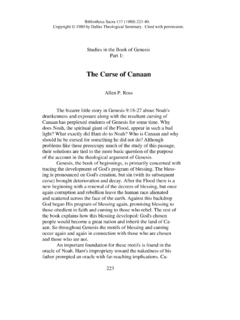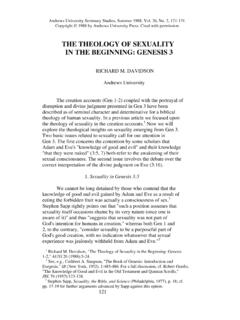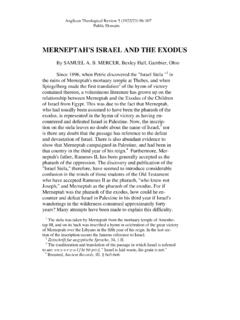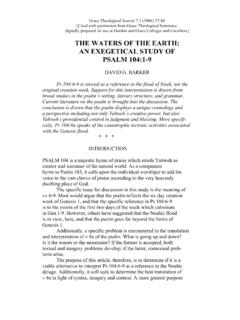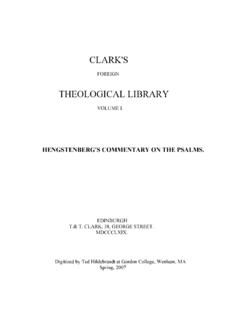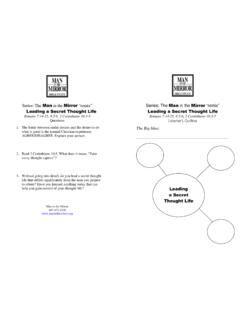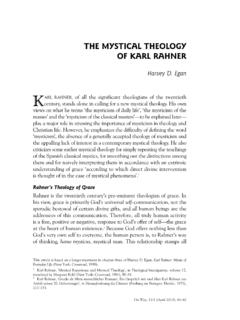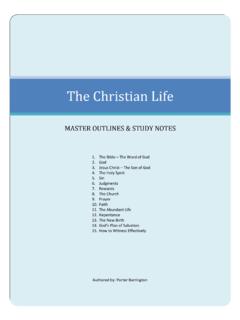Transcription of ROMANS 7:14-25: PAULINE TENSION IN THE …
1 Grace Theological Journal (Fall 1981) 239-57 Copyright 1981 by Grace Theological Seminary. Cited with permission. ROMANS 7:14-25: PAULINE TENSION IN THE christian life DAVID S. DOCKERY The interpretation of Rom 7:14-25 has been problematic his- torically. Does the passage reflect Paul s pre-conversion experience under the law? This was a major interpretation of the church fathers, or does this passage describe Paul s TENSION in the christian life ? The latter position is defended here by an interpretation of the exegetical considerations and an examination of the theological implications.
2 * * * INTRODUCTION ROM 7:14-25 has without exaggeration been described as "the most discussed and fought over part 1 of the epistle. In this grand epistle there are several perplexing problems for the interpreter. Without a doubt, Rom 5:12-21 and 9:1-11:36 guarantee a difficult task for the Yet, as MacGorman says, "My nomination for the most difficult passage in this letter to interpret is ROMANS 7:1-25. 3 Nygren says: It presents us with one of the greatest problems in the New Testament. It was already recognized in the first century; and since that time it has never come to rest. (4) The predominant question in the interpretation of these verses is one on which there have been deep-seated differences of judgment in 1.
3 A. Nygren, A Commentary on ROMANS , translated by C. Rasmussen Philadelphia: Fortress, 1949), 2. Cf. S. L. Johnson. " ROMANS 5:12-An Exercise in Exegesis and Theology in New Dimensions in New Testament Study (Grand Rapids: Zondervan, 1974) 298-316, and B. Corley, " ROMANS 9-11 in Southwestern Journal of Theology 19 (Fall, 1976) 43ff. 3. MacGorman, " ROMANS 7 Once More," in Southwestern Journal of Theology 19 (Fall, 1976) 31. 4. Nygren, A Commentary on ROMANS , 284. 240 GRACE THEOLOGICAL JOURNAL the history of the This essay will seek to answer the important exegetical questions and attempt to relate it to Paul's theology. ROMANS 7 is thus seen as one of the pivotal passages in Paul's theology.
4 Since the passage is located at the heart of Paul's explanation of the outworking of one's salvation, the view which is adopted will have a tremendous impact upon one's theology of the christian life . "One side sees too much bondage to sin for a christian , and the other sees too much desire for the good for a sinner. 6 A proper understanding of the nature of indwelling sin will have a significant effect upon the first of these views, if indeed it can be demonstrated that this passage refers to the christian experience. In this section and the previous verses (7-13), Paul appears to be speaking autobiographically. The reader cannot help but notice the extensive use of the personal pronoun "I." In vv 7-21, Paul uses I, me and my no less than 46 times, as translated in the NASB.
5 In the Greek text, the eight emphatic uses of the personal pronoun I further enhance that aspect. The question which must be answered is whether this usage is rhetorical, typical, or In vv 14-25, Paul continues to speak in the first person singular, but he leaves the past tense and turns to the present tense. The meaning and significance of this change has great bearing upon one s interpretation. The problem that should be considered concerns the temporal reference of the passage and the identity of the subject. 8 What sounded like past testimony in vv 7-13 seems to be present experience in vv 14-25. Present tenses regularly describe action or state of being which is contemporary with the writer. The present tenses also signify a characterization of The third problem is the meaning of the anthropological or psychological terms which are so frequently used, as well as the 5.
6 J. Murray, The Epistle to the ROMANS (NICNT; Grand Rapids: Eerdmans, 1959) 256. 6. D. Moody, ROMANS , in The Broadman Bible Commentary (12 vols., Nashville: Broadman, 1970) 7. C. E. B. Cranfield in his commentary on ROMANS lists several suggestions which have been proposed. He concludes that it is an example of the general use of the first person singular. He continues saying that this is due not, merely to a desire for rhetorical vividness, but also to his deep sense of personal involvement, his conscious- ness, that in drawing out the general truth, he is disclosing the truth about himself. Cf. ROMANS (ICC; Edinburgh: T. & T. Clark, 1975) 8. R. Y. K. Fung, The Impotence of the Law: Toward a Fresh Understanding of ROMANS 7: l4-25, in Scripture, Tradition, and Interpretation (Grand Rapids: Eerdmans, 1978) 34.
7 9. The present tenses are sometimes taken as historical presents to describe the past in a vivid manner, but this is the exception and not the normal interpretation. DOCKERY: PAULINE TENSION IN THE christian life 241 intensity of the language expressed in military terms. The definition of these terms will be most important for a proper understanding of the conflict described. The fourth major problem is the usage of law. The interpreter must seek to determine whether it is law as principle, the law of God (Torah), or another possible meaning. The context will aid greatly in the consideration of this question. VARIOUS VIEWPOINTS Throughout the history of the Church, many interpretations have been offered for this much-debated passage.
8 It is not my purpose to explain each of these views, but only to summarize briefly those which are significant. The various interpretations, as it will be seen, cannot necessarily be grouped into certain theological or denominational camps. Does the passage describe his present struggle as a christian or his former experience as a man under law? Or does it possibly transcend the "then" and "now" categories?10 View 1 It is much debated whether the experience recounted is that of Paul as an unregenerate or as a regenerate The former position has generally been the prevalent view of most interpreters. Interpreters who take this position point especially to v 14, "I am made of flesh sold under the bondage of sin," and affirm that this could hardly be said of a christian , especially in light of Paul's statement in ROMANS 6.
9 The Greek fathers generally adopted this position, as have Althaus, Kertelge, Kuzinger, Dodd, Sanday- Headlam, Moffatt, and Kurzinger says that to understand ROMANS 7 as referring to Paul's post-conversion experience is a misunderstanding of Paul's The change of tense is explained by exponents of this view in terms of a close logical connection between the two sections; the latter section merely describes the result of the irrevocable history 10. MacGorman, " ROMANS 7 Once More." 34. 11. For a detailed summary of the various views, the reader is encouraged to see S. Lyonnet, "L 'historre du salut selon le chapitre vii do l'epitre aux Romains," Bib 43 (1962) 117-51, and A. Nygren, A Commentary on ROMANS , 284ff. 12. See the listings in K.
10 Von Kertelge, "Exegetische Uberlegungen zum Verstandnis der paulinischen Anthropologie nach Romer 7," ZNW62 (1971) 105, and MacGorman, " ROMANS 7 Once More," 35. C. H. Dodd is probably the outstanding representative of this view. Cf C. H. Dodd, The Epistle of Paul to the ROMANS (London: Fontana, 1959) 125-26. 13. J. Kursinger, "Der Schlussel zum Verstandnis von Rom 7," BZ 7 (1963) 274. 242 GRACE THEOLOGICAL JOURNAL narrated in the earlier section, but both the history and result are a part of the past. (14) One of the difficulties involved in this view is v 25b, if actual deliverance has arrived in the preceding verses (14-25a). Thus, men like Michel attempt to transpose the verses,15 but there is absolutely no textual evidence for such a The sugges- tion involves supposing a drastic change in subject between v 24 (non- christian ) and v 25a ( christian ).
